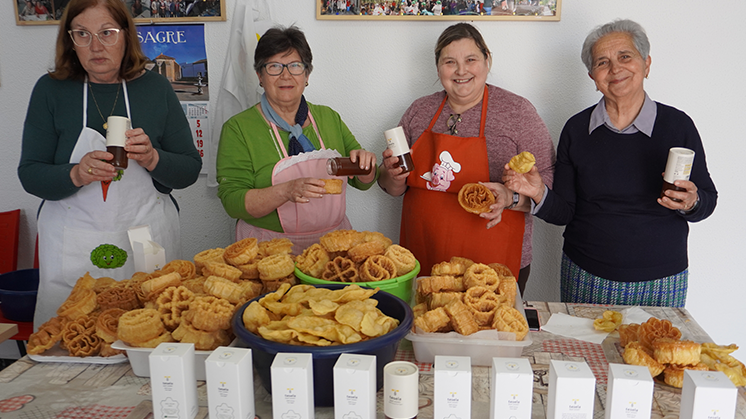Solar honey from the Núñez de Balboa photovoltaic plant will be used to make handmade sweets
-
The honey, produced by the hives installed in the photovoltaic plant that Iberdrola has in Usagre (Badajoz), has been delivered to the Town Council and the local Women's Association.
The honey will be used to prepare typical sweets that to be tasted during the celebration of International Women's Day

Iberdrola has delivered the first batch of 70 jars of solar honey produced at the photovoltaic plant of Núñez de Balboa (Badajoz). External link, opens in new window. Half of them have gone to the Usagre Women's Association, and the other 35 have been delivered to the Town Council and will be donated to the new municipal elderly care home that will open its doors in summer with a capacity for 31 residents.
External link, opens in new window. Half of them have gone to the Usagre Women's Association, and the other 35 have been delivered to the Town Council and will be donated to the new municipal elderly care home that will open its doors in summer with a capacity for 31 residents.
The presentation ceremony was attended by members of the Association, including its president, Lole Baena, and the head of Iberdrola Renovables in Extremadura, Nicolás Antón. "It is a sign of Iberdrola's commitment to the environment, and evidence of the coexistence of renewable projects and ecosystems. The honey used to make the sweets is made from high quality broom and is produced under the protection of the photovoltaic panels" said Nicolás.
Iberdrola promotes this initiative together with the company Tesela Natura, which has collaborated with the company to install 105 hives in the photovoltaic plant that house five million bees. The Núñez de Balboa photovoltaic park has the capacity to supply clean energy to some 250,000 people and prevents the emission into the atmosphere of 215,000 tons of CO2 per year.
Protecting biodiversity
This is not the first project of this type to be implemented by Iberdrola. For the past two years, it has been installing beehives at its photovoltaic plants with the aim of preserving biodiversity around its renewable energy developments and protecting a species as emblematic and important as bees.
In March 2021, 162 hives were installed at the Andévalo photovoltaic plant External link, opens in new window. in Huelva, and more than 100 kilos of honey have already been collected and delivered to women's associations for charitable purposes. The funds raised during their sale have been used to help those affected on the island of La Palma or Ukrainian refugees.
External link, opens in new window. in Huelva, and more than 100 kilos of honey have already been collected and delivered to women's associations for charitable purposes. The funds raised during their sale have been used to help those affected on the island of La Palma or Ukrainian refugees.
The photovoltaic plants become spaces where a highly valued honey is produced on herbicide-free land, as weed growth is controlled manually or by grazing sheep on the premises. At the same time, these facilities offer beekeepers safe, theft-free spaces. Bees pollinate more than 80% of the world's plants and more than 90 different types of crops. Currently, 75% of the food we eat depends on pollination.
Iberdrola reaffirms its firm commitment to sustainability and the protection of nature. On November 9, Iberdrola announced its Biodiversity Plan 2030, whereby it undertakes to ensure that its activities result in a net positive balance with biodiversity. This commitment affects all activities: construction, operation and decommissioning of assets. Therefore, nature protection and conservation actions will be substantially increased in the coming years with more ambitious mitigation projects and compensation and restoration actions.
Grupo Iberdrola
